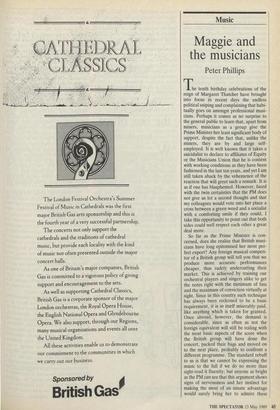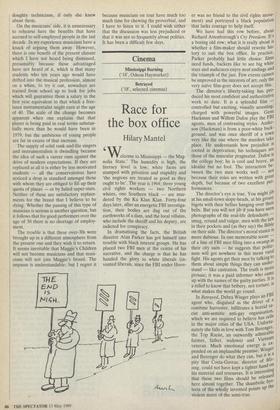M u s i c
Maggie and the musicians
Peter Phillips
The tenth birthday celebrations of the reign of Margaret Thatcher have brought into focus in recent days the endless political sniping and complaining that habi- tually goes on amongst professional musi- cians. Perhaps it comes as no surprise to the general public to learn that, apart from miners, musicians as a group give the Prime Minister her least significant body of support, despite the fact that, unlike the miners, they are by and large self- employed. It is well known that it takes a suicidalist to declare to affiliates of Equity or the Musicians Union that he is content with working conditions as they have been fashioned in the last ten years, and yet I am still taken aback by the vehemence of the reaction that will greet such a remark. It is as if one has blasphemed. However, faced with the twin certainties that the PM does not give us lot a second thought and that my colleagues would vote into her place a cross between a green weed and a socialist with a comforting smile if they could, I take this opportunity to point out that both sides could well respect each other a great deal more.
So far as the Prime Minister is con- cerned, does she realise that British musi- cians have long epitomised her most per- fect export? Any foreign musical competi- tor of a British group will tell you that we produce more accurate performances cheaper, thus rudely undercutting their market. This is achieved by training our orchestral players and singers alike to get the notes right with the minimum of fuss and the maximum of conviction virtually at sight. Since in this country such technique has always been reckoned to be a basic requirement, it is in itself miserably paid, like anything which is taken for granted. Once abroad, however, the demand is considerable, since as often as not the foreign equivalent will still be toiling with the most basic aspects of the score when the British group will have done the concert, packed their bags and moved on to the next place, probably to confront a different programme. The standard rebuff to us is that we cannot be expressing the music to the full if we do no more than sight-read it fluently; but anyone as bright as the PM can see that this argument shows signs of nervousness and her instinct for making the most of an innate advantage would surely bring her to admire these
doughty technicians, if only she knew about them.
On the musicians' side, it is unnecessary to rehearse here the benefits that have accrued to self-employed people in the last decade. In my experience musicians have a knack of arguing them away. However, there is one benefit of the present climate which I have not heard being dismissed, presumably because those advantaged have not heard of it, which is that many students who ten years ago would have drifted into the musical profession, almost on a whim, to try it out, nowadays are trained from school up to look for jobs which will guarantee them a salary in the first year equivalent to that which a free- lance instrumentalist might earn at the age of 40. The scale of the change becomes apparent when one explains that that player is being paid in real terms substan- tially more than he would have been in 1979; but the ambitions of young people are far in excess of that increase.
The supply of solid rank-and-file singers and instrumentalists is dwindling because the idea of such a career runs against the drive of modern expectations. If they are replaced at all it is either by less motivated students — all the conservatoires have noticed a drop in standard amongst those with whom they are obliged to fill up their quota of places — or by failed super-stars. Neither of these are satisfactory replace- ments for the breed that I believe to be dying. Whether the passing of this type of musician is serious is another question, but it follows that for good performers over the age of 30 there is no shortage of employ- ment.
The trouble is that these over-30s were brought up in a different atmosphere from the present one and they wish it to return. It seems inevitable that Maggie's Children will not become musicians and that musi- cians will not join Maggie's brood. The impasse is understandable; but I regret it because musicians on tour have much too much time for chewing the proverbial, and I have to listen to it. I could wish either that the discussion was less prejudiced or that it was not so frequently about politics. It has been a difficult few days.



























































 Previous page
Previous page